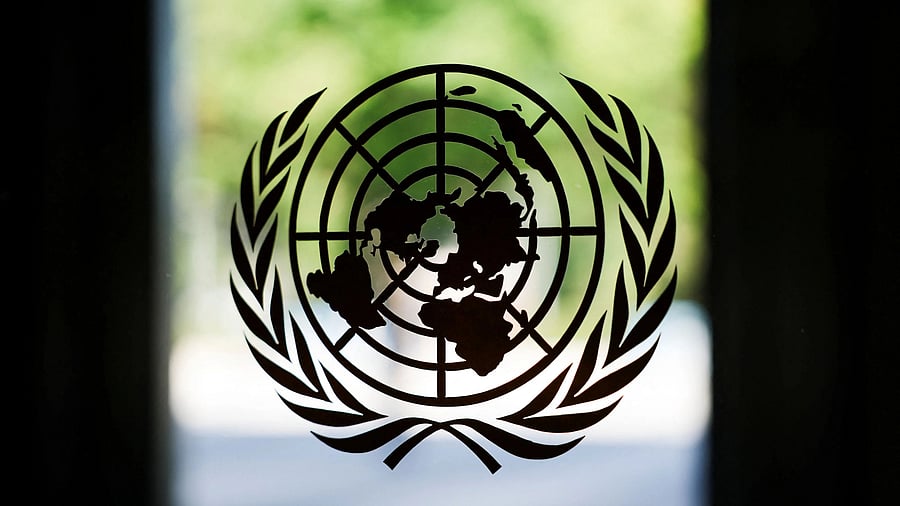
The United Nations logo
Credit: Reuters Photo
As the United Nations marked its 80th anniversary on October 24, 2025, its founding purpose—promoting peace, human rights, and sustainable development—remains as relevant as ever. While debates continue over whether the UN is still ‘fit for purpose’ amid geopolitical tensions, climate crises, and deepening inequality, its role in advancing the rights of persons with disabilities—who make up 16% of the world’s population—remains vital, especially in the context of low- and middle-income countries.
Over 80% of persons with disabilities live in these countries and remain largely excluded from mainstream development even as the UN is providing assistance to over 100 million people impacted by humanitarian crises globally. Even though 192 nations have ratified the Convention on the Rights of Persons with Disabilities (CRPD), national governments still fail to prioritise human rights of persons with disabilities. Evidence shows that persons with disabilities are disproportionately affected by conflicts and emergencies in low- and middle-income countries—
their mortality rate is two to four times higher than that of persons without disabilities.
The UN’s disability rights movement dates back to 1981, declared the ‘International Year of the Disabled Persons’ by the UN General Assembly. Since then, several milestones have followed. Two significant ones are the adoption of the CRPD in 2006 and the UN Disability Inclusion Strategy (UNDIS) in 2019. It was only after 13 years of adoption of the CRPD that the UN realised the need for a sustainable and transformational change within the organisation to make the UN fit for purpose by developing a system-wide disability inclusion strategy to embed disability inclusion across all pillars of its work. The UNDIS attempts to mainstream disability inclusion both at the entity level and at the level of UN Country Teams (UNCTs).
However, progress has been uneven. After five years of implementation (2019-2023), the UN Secretary General’s report found that only 38% of the UN entities and 41% of the UNCTs had met requirements of disability inclusion under the UNDIS accountability framework. The 2023 UN Secretary General report acknowledged “noteworthy progress” in many areas of strategy but concluded that over half of the disability inclusion indicators remain unmet. This finding prompted a system-wide evaluation in 2024-2025 by the UN Sustainable Development Group’s Evaluation Office to assess how the UN could better support member states in implementing the CRPD and achieving Sustainable Development Goals (SDGs) for 1.3 billion persons with disabilities.
The evaluation identified critical gaps, among which leadership of the UN entities and UNCT should be accorded priority. Senior management across UN entities and the UNCTs—Resident Coordinators, Deputy Coordinators and Country Representatives—are expected to complete a disability inclusion training course titled ‘The UN Disability Inclusion Strategy: Putting Words into Action’. Yet, as of September 2025, only 6% of the senior leaders had done so. Low capacities of the Disability Focal Points identified within the UNCTs could be further addressed through available training courses on disability inclusion.
The UN Resident Coordinators’ offices play a significant role in ensuring the UN Sustainable Development Cooperation Framework (UNSCDF) includes entry points for disability inclusion. Meaningful participation of organisations of persons with disabilities (OPDs) through their representative organisations during the design of these frameworks can ensure that key concerns are reflected in line with the UNDIS. Similarly, UN agencies should include OPDs in developing country programme documents, allowing persons with disabilities to share their lived experiences and shape inclusive policies and programmes.
There are encouraging examples like that of UNFPA, Lao PDR, in developing an MoU with OPDs to promote their active participation in policy and programme planning and implementation—a model other UN entities could emulate at
the country level. Yet another good practice is from the UN Resident Coordinator’s office in India, which has a full-time Disability Rights Officer to provide inter-agency, cross-sectoral support for the implementation of the UNDIS and the country action plan.
According to the UNDIS 2023 report on the UN Secretary General, only 44% of entities reflected disability inclusion in their results statements and indicators, disaggregating data by disability and sex, and developing interventions to improve disability inclusion. UNDIS Indicator #10 is about mainstreaming disability effectively throughout the evaluation process, and disability inclusion should be clearly specified in the ToR, inception and evaluation reports. This is conspicuously absent in the evaluation processes of many UN entities across regions, which seriously impacts the planning of future country programmes on the basis of lessons learnt from the previous country programme cycles. So also having a disability expert to support the evaluation team enables the evaluation team to identify gaps and provide recommendations for disability inclusion.
There is a strong bidirectional link between the rule of law and disability inclusion. The spectrum of disability inclusion is wider in countries that have stronger adherence to the rule of law. With more than 80% of persons with disabilities living in low- and middle-income countries, the UN, as a technical partner of the national governments, has a predominant role in ensuring the human rights of persons with disabilities are protected and promoted across humanitarian and development contexts.
(The writer is a former Chief Technical Advisor, UNDP, Lao PDR)